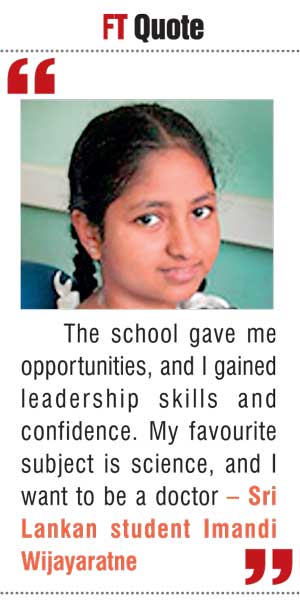Saturday Feb 21, 2026
Saturday Feb 21, 2026
Friday, 1 April 2016 00:00 - - {{hitsCtrl.values.hits}}
The knowledge hub provides access to, and improves the quality of primary and secondary education. Here, first grade students attend a computer class – Joe Qian/World Bank
Every morning, students at Sujatha Balika Vidyalaya School attend assembly before heading off to class. The graduation rate of students through Grade 11 is now 85% compared to 82% overall in 2011 – Joe Qian/World Bank
The number of direct project beneficiaries is about 3.2 million students thus far, of which female students account for 52% – Joe Qian/World Bank
Sri Lanka has promoted equitable access to roughly 3.2 million students, with 52% of them female
students, and improved the quality of education by promoting school-based teacher development and the
regular measurement oflearning outcomes and through strengthening governance and delivery of education services
Challenge
www.worldbank.org: Sri Lanka has approximately four million school children with 215,000 teachers and around 10,000 schools. The main obstacle is that public investments in education were modest when compared to countries with similar income status.
Education expenditure accounted for 1.9% of GDP, which was roughly 7.3% of the Government Budget in 2014. More education investments are needed to improve schools to meet the demands of the modern global economy. In addition, education for key skills for a knowledge hub, such as English language, ICT, science and mathematics, are limited and need to expand considerably. And lastly, there are wide regional disparities in the current education system.

Solution
Transforming the School Education System as the Foundation of a Knowledge Hub Project (TSEP) has been designed to promote students’ access to, and quality of primary and secondary education to provide a foundation for the knowledge-based economic and social development of the country. It supports the Sri Lanka Government’s development initiative called the Program for School Improvement, which aims to strengthen school performance and improve student learning.
Several innovative reforms are also being supported, including the establishment of a system for conducting national assessments of learning outcomes, school-based management, and school-based teacher development.
Results
The TSEP, which is focused on enhancing equitable access and quality of primary and secondary education, has helped to support improvements in several key outcomes:
Bank Group contribution
IDA has provided financing for the education sector in Sri Lanka over a long period of time to improve the quality of human capital through effective education and skills development. This $100 million project is the fifth education project in Sri Lanka.
Partners
The World Bank, UNESCO, UNICEF, Germany’s GIZ, the Asian Development Bank, the Australian Government Department of Foreign Affairs and Trade, and the Korean International Cooperation Agency are active key development partners in the primary and secondary education sector in Sri Lanka. There is a strong partnership among partners and we are working in support of the Government’s overall Education Sector Development Framework and Program (ESDFP) for 2013-2017.
As a coordinating agency, the World Bank ensures that the activities done by development partners are harmonised with the government program. Australian Government supports the ESDFP through a trust fund agreement with the World Bank.
Moving forward
The project has been aligned with the Government’s Education Sector development Framework and Program and will continue to help the Government strengthen the country’s school education system at all levels. The project has promoted school completion up to age 16 for both boys and girls.
The operational work is underpinned and supported by analytical work. Linking financial support to the achievement of results, this project was the first results-based financing operation in Sri Lanka.